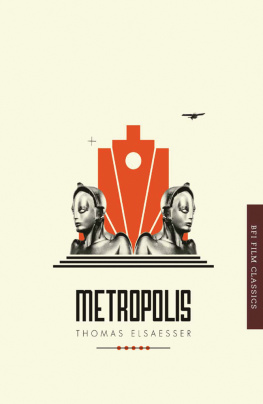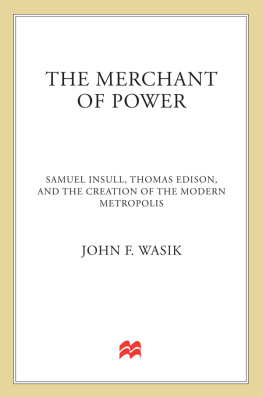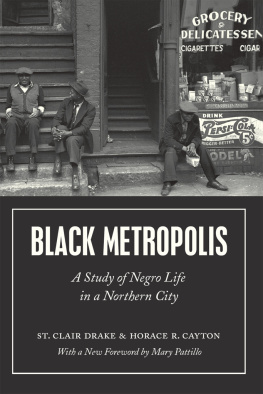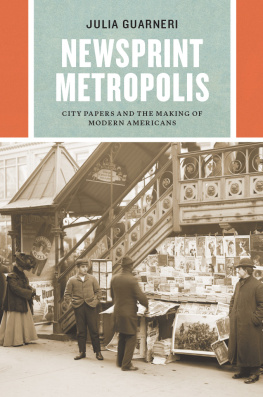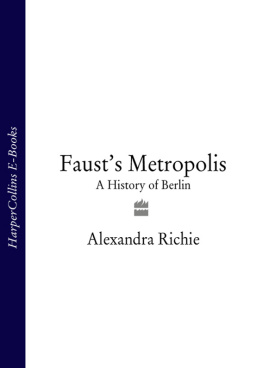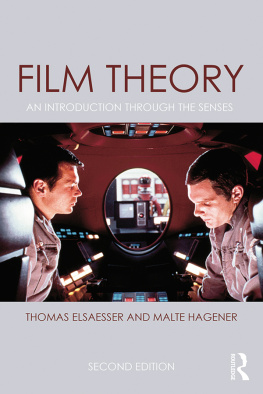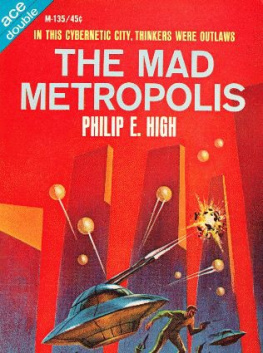Thomas Elsaesser - Metropolis
Here you can read online Thomas Elsaesser - Metropolis full text of the book (entire story) in english for free. Download pdf and epub, get meaning, cover and reviews about this ebook. year: 2019, publisher: Bloomsbury Publishing, genre: Detective and thriller. Description of the work, (preface) as well as reviews are available. Best literature library LitArk.com created for fans of good reading and offers a wide selection of genres:
Romance novel
Science fiction
Adventure
Detective
Science
History
Home and family
Prose
Art
Politics
Computer
Non-fiction
Religion
Business
Children
Humor
Choose a favorite category and find really read worthwhile books. Enjoy immersion in the world of imagination, feel the emotions of the characters or learn something new for yourself, make an fascinating discovery.
- Book:Metropolis
- Author:
- Publisher:Bloomsbury Publishing
- Genre:
- Year:2019
- Rating:3 / 5
- Favourites:Add to favourites
- Your mark:
- 60
- 1
- 2
- 3
- 4
- 5
Metropolis: summary, description and annotation
We offer to read an annotation, description, summary or preface (depends on what the author of the book "Metropolis" wrote himself). If you haven't found the necessary information about the book — write in the comments, we will try to find it.
Metropolis — read online for free the complete book (whole text) full work
Below is the text of the book, divided by pages. System saving the place of the last page read, allows you to conveniently read the book "Metropolis" online for free, without having to search again every time where you left off. Put a bookmark, and you can go to the page where you finished reading at any time.
Font size:
Interval:
Bookmark:

BFI Film Classics: A brief history
The BFI Film Classics series grew out of a project initiated by the National Film and Television Archive (NFTVA), a division of the BFI, to build a collection of perfect showprints of 360 key films in the history of cinema. These films were to be screened at the Museum of the Moving Image (MOMI) in London in a year-round repertory. The 360 list of classic films was drawn up by David Meeker of the NFTVA, and the BFI Film Classics books were commissioned to stand alongside the Archive project.
Distinguished film critics and scholars, film-makers, novelists and poets, historians and writers from other spheres of the arts and academia were approached to write on a film of their choice from the 360 list. Each volume was to present the authors own insights into the chosen film, together with a brief production history and detailed credits, notes and bibliography. In a time before DVDs and screengrabs, the books numerous illustrations were specially made from the Archives own prints and sourced from the BFIs stills collection.
The series was developed and its first titles commissioned by Edward Buscombe, then Head of Publishing at the BFI. Colin MacCabe and David Meeker acted as series consultants. Rob White was the Series Editor at the BFI from 1996 to 2005.
The series was launched in May 1992 with four titles: The Wizard of Oz by Salman Rushdie; Double Indemnity by Richard Schickel; Stagecoach by Edward Buscombe and Went the Day Well? by Penelope Houston.
A sister series, BFI Modern Classics, was launched in 1996 to respond to notable films of modern and contemporary cinema. Over 60 titles were published in this series before it was absorbed within the main Film Classics series in 2007, and the combined series was relaunched with a new cover and text design. There are currently over 160 titles in print in the Film Classics, Modern Classics and combined Film Classics series.
A BFI Film Classics series advisory board, comprising representatives from the BFI, as well as leading film scholars and critics, was established in 2007. Since 2008 BFI Publishing titles, including the BFI Film Classics series, have been published by Palgrave Macmillan in partnership with the BFI.

Contents

Metropolis Redux
On 7 February 2008, the German weekly Die Zeit carried a special supplement devoted to one of the most sensational film history finds in recent years: the missing scenes from Metropolis:
Last Tuesday Paula Flix-Didier travelled on a secret mission to Berlin in order to meet with three film experts and editors from ZEITmagazin. The museum director from Buenos Aires had something special in her luggage: a copy of a long version of Fritz Langs Metropolis, including scenes believed lost for almost 80 years. After examining the film the three experts are certain: The find from Buenos Aires is a real treasure, a worldwide sensation. Metropolis, the most important silent film in German history, can from this day on be considered to have been rediscovered.
Fritz Lang presented the original version of Metropolis in Berlin in January 1927. [] The most expensive German film ever made, it was intended to be a major offensive against Hollywood. However the film flopped with critics and audiences alike. Representatives of the American firm Paramount considerably shortened and re-edited the film. [] The original version could only be seen in Berlin until May 1927 from then on it was considered to have been lost forever.
ZEITmagazin has now reconstructed the story of how the film nevertheless managed to survive. Adolfo Z. Wilson, a man from Buenos Aires and head of the Terra film distribution company, arranged for a copy of the long version of Metropolis to be sent to Argentina in 1928 to show it in cinemas there. Shortly afterwards a film critic called Manuel Pea Rodrguez came into possession of the reels and added them to his private collection. In the 1960s Pea Rodrguez sold the film reels to Argentinas National Art Fund clearly nobody had yet realized the value of the reels. A copy of these reels passed into the collection of the Museo del Cine (Cinema Museum) in Buenos Aires in 1992, the curatorship of which was taken over by Paula Flix-Didier in January 2008. Her ex-husband, director of the film department of the Museum of Latin American Art, first entertained the decisive suspicion: He had heard from the manager of a cinema club, who years before had been surprised by how long a screening of this film had taken. Together, Paula Flix-Didier and her ex-husband took a look at the film in her archive and discovered the missing scenes [].
Helmut Possmann, director of the Friedrich-Wilhelm-Murnau Foundation, the holder of the rights to Metropolis, said to ZEITmagazin: The material believed to be lost leads to a new understanding of the Fritz Lang masterpiece. The Murnau Foundation now sees itself as responsible, along with the archive in Buenos Aires and our partners for making the material available to the public.
The discovery of this badly scratched, 16mm preservation copy made headlines throughout the world.
Such glum speculations are, at least in this case, misplaced: the restored version of Metropolis more than compensates for any lingering nostalgia film lovers might have had invested in the lacunary version, one that Enno Patalas, former director of the Munich film museum and perhaps the first to seriously dream of
By using what persuasive powers I could muster and putting some cultural capital on the line, I did manage to see this newly restored version of Metropolis on its premiere night on 12 February 2010. Not in Berlins Friedrichstadtpalast, but in a parallel performance, at the Frankfurt Opera, with the added bonus of Paula Flix-Didier in attendance (and recorded for broadcast by the Arte television channel). The experience was unique, not merely because of the excitement the event had generated in the press, and the sense of being present at a historic occasion: the rebirth of a masterpiece.windows into another version, the one from 85 years ago. In fact, we can now experience two films: the old familiar one and the new one, which of course is how the old one should have been. What is restored, in other words, is also the material history of the prints, and thus another aspect of Metropolis status as a classic. Far from diminishing the allure of the fragment, it preserves it as the trace of time itself.
Restoring the Story: Doubles and Delegation
Aware of the exemplary value of their work, the restoration team put up a website, assembling sample scenes to show how the process of digitally cleaning, stabilizing and contrast correction had gradually brought the distressed 16mm material back to life; Spanish title cards had to be replaced with German ones, and a page from an illustrated Bible about the whore of Babylon was painstakingly re-translated and re-created.
However, as Martin Koerber has pointed out in seminars, scenes are still missing. David Bordwell, attending one such seminar in Hong Kong in April 2010, conveniently summarized them: some shots in the Argentine version may have been censored; were missing a bit in which Georgy, at liberty in a cab, sees a woman baring her body. Also lacking is nearly all the fight between Rotwang and Fredersen, which enables Marias escape. In addition, the Argentine print lacks a scene showing a monk preaching in the cathedral, which yields some apocalyptic images.
Font size:
Interval:
Bookmark:
Similar books «Metropolis»
Look at similar books to Metropolis. We have selected literature similar in name and meaning in the hope of providing readers with more options to find new, interesting, not yet read works.
Discussion, reviews of the book Metropolis and just readers' own opinions. Leave your comments, write what you think about the work, its meaning or the main characters. Specify what exactly you liked and what you didn't like, and why you think so.

